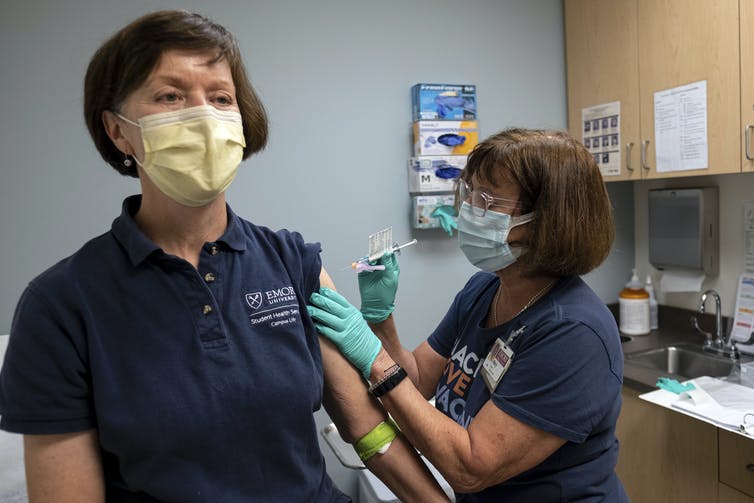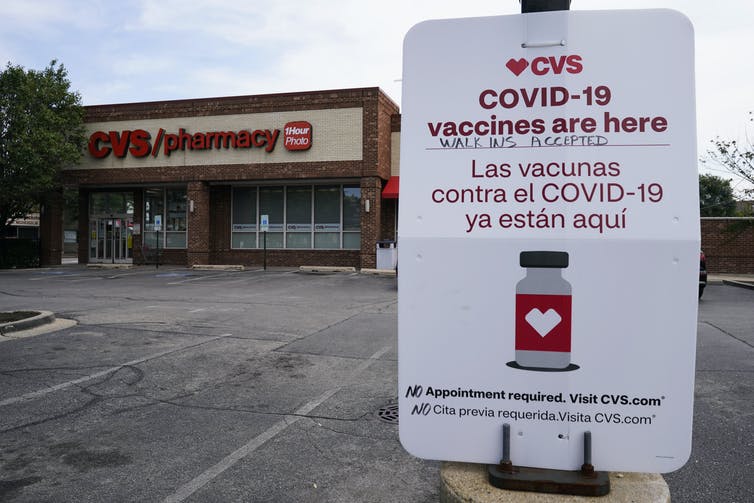
The pandemic has brought many tricky terms and ideas from epidemiology into everyone’s lives. Two particularly complicated concepts are vaccine efficacy and effectiveness. These are not the same thing. And as time goes on and new variants like omicron emerge, they are changing, too. Melissa Hawkins is an epidemiologist and public health researcher at American University. She explains the way researchers calculate how well a vaccine prevents disease, what influences these numbers and how omicron is changing things.
Table of Contents
1. What do vaccines do?
A vaccine activates the immune system to produce antibodies that remain in your body to fight against exposure to a virus in the future. All three vaccines currently approved for use in the U.S. – the Pfizer-BioNTech, Moderna and Johnson & Johnson vaccines – showed impressive success in clinical trials.

AP Photo/Ben Gray
2. What is the difference between vaccine efficacy and effectiveness?
All new vaccines must undergo clinical trials in which researchers test the vaccines on thousands of people to examine how well they work and whether they are safe.
Efficacy is the measure of how well a vaccine works in clinical trials. Researchers design the trials to include two groups of people: those who receive the vaccine and those who receive a placebo. They calculate the vaccine’s efficacy by comparing how many cases of the illness occur in each group, vaccinated versus placebo.
Effectiveness, on the other hand, describes how well a vaccine performs in the real world. It is calculated the same way, by comparing illness among vaccinated and unvaccinated people.
Efficacy and effectiveness are usually close to each other but won’t necessarily be the same. How the vaccines work will vary a bit from the trial results once millions of people are getting vaccinated.
Many factors influence how a vaccine performs in the real world. New variants like delta and omicron may change things. The number and age of people enrolled in the trials matter. And the health of those receiving the vaccine is also important.
Vaccine uptake – the proportion of a population that gets vaccinated – can also influence vaccine effectiveness. When a large enough proportion of the population is vaccinated, herd immunity begins to come into play. Vaccines with moderate or even low efficacy can work very well at a population level. Likewise, vaccines with high efficacy in clinical trials, like coronavirus vaccines, may have lower effectiveness and a small impact if there isn’t high vaccine uptake in the population.
The distinction between efficacy and effectiveness is important, because one describes the risk reduction achieved by the vaccines under trial conditions and the other describes how this may vary in populations with different exposures and transmission levels. Researchers can calculate both, but they can’t design a study that will measure both simultaneously.
3. How do you calculate efficacy and effectiveness?
Both Pfizer and Moderna reported that their vaccines demonstrated more than 90% efficacy in preventing symptomatic COVID-19 infection. Stated another way, among those individuals who received the vaccine in the clinical trials, the risk of getting COVID-19 was reduced by 90% compared with those who did not receive the vaccine.
Imagine conducting a vaccine trial. You randomize 1,000 people to receive the vaccine in one group. You randomize another 1,000 to be given a placebo in the other group. Say 2.5% of people in the vaccinated group get COVID-19 compared with 50% in the unvaccinated group. That means the vaccine has 95% efficacy. We determine that because (50% – 2.5%)/50% = .95. So 95% indicates the reduction in the proportion of disease among the vaccinated group. However, a vaccine with 95% efficacy does not mean 5% of vaccinated people will get COVID-19. It’s even better news: Your risk of illness is reduced by 95%.
Vaccine effectiveness is calculated the exact same way but is determined through observational studies. Early on, vaccines were well over 90% effective at preventing severe illness in the real world. But, by their very nature, viruses change, and this can change effectiveness. For example, a study found that by August 2021, when delta was surging, the Pfizer vaccine was 53% effective at preventing severe illness in nursing home residents who had been vaccinated in early 2021. Age, health issues, waning immunity and the new strain all lowered effectiveness in this case.

Alexey Solodovnikov, Valeria Arkhipova/WikimediaCommons, CC BY-SA
4. What about the omicron variant?
The preliminary data about omicron and vaccines is coming in quickly and is revealing lower vaccine effectiveness. Best estimates suggest vaccines are around 30%-40% effective at preventing infections and 70% effective at preventing severe disease.
A preprint study – one not formally reviewed by other scientists yet – that was conducted in Germany found that antibodies in blood collected from people fully vaccinated with Moderna and Pfizer showed reduced efficacy in neutralizing the omicron variant. Other small preprint studies in South Africa and England showed a significant decrease in how well antibodies target the omicron variant. More breakthough infections are expected, with decreased immune system ability to recognize omicron compared with other variants.

AP Photo/Nam Y. Huh
5. Do boosters boost immunity against omicron?
Initial data reinforces that a third dose would help boost immune response and protection against omicron, with estimates of 70%-75% effectiveness.
Pfizer has reported that people who have received two doses of its vaccine are susceptible to infection from omicron, but that a third shot improves antibody activity against the virus. This was based on lab experiments using the blood of people who have received the vaccine.
Booster doses can increase the amount of antibodies and the ability of a person’s immune system to protect against omicron. However, unlike the U.S., much of the world does not have access to booster doses.
6. What does this all mean?
Despite the lowered effectiveness of vaccines against omicron, it is clear that vaccines do work and are among the greatest public health achievements. Vaccines have varying levels of effectiveness and are still useful. The flu vaccine is usually 40%-60% effective and prevents illness in millions of people and hospitalizations in more than 100,000 people in the U.S. annually.
Finally, vaccines protect not only those who are vaccinated, but those who can’t get vaccinated as well. Vaccinated people are less likely to spread COVID-19, which reduces new infections and offers protection to society overall.
[Get The Conversation’s most important coronavirus headlines, weekly in a science newsletter]
![]()
Melissa Hawkins receives funding from USDA/NIFA.
























